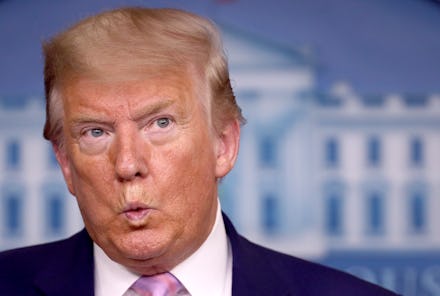3M is not here for Trump's mask-shaming tweets

President Trump has declared himself a "wartime" president, eager to be seen as ready to wage glorious battle against coronavirus, which is currently rampaging across the nation. But with thousands dead, hundreds of thousands more infected, and a conspicuous reluctance to invoke the Defense Production Act — which was literally created in wartime, for wartime problems — that would give him the authority to ramp up production of lifesaving medical gear, Trump has seemingly spent as much time fighting the very businesses he needs to help combat the disease as he has the disease itself.
First, he spent time fuming at General Motors for not manufacturing enough ventilators to his liking — a consternation he addressed by ordering them to "invoke 'P'."
Thanks for clearing that up, Mr. President.
This week, the president turned his ire away from ventilators and toward protective face masks. Specifically, Gizmodo wrote, Trump was "shocked" to learn that because he hadn't explicitly ordered manufacturing giant 3M to stop selling its N95 respirator masks overseas and provide them to the U.S. instead — which he could've done under the Defense Production Act — the company had, well, continued selling them overseas. And so on Thursday morning, Trump lashed out at yet another American manufacturing giant, tweeting that he'd hit 3M "hard today, after seeing what they were doing with their masks."
Despite having plenty of characters to spare in his tweet, Trump nevertheless went with the uncomfortably truncated "'P Act' all the way" to order 3M to comply with his demands.
But 3M, which employs nearly 100,000 employees worldwide, wasn't having it. In a politely firm statement posted to the company website Friday, 3M offered a few paragraphs of perfunctory genuflection toward the Trump administration, before essentially telling the White House to back off. Per the statement (emphasis mine):
The administration also requested that 3M cease exporting respirators that we currently manufacture in the United States to the Canadian and Latin American markets. There are, however, significant humanitarian implications of ceasing respirator supplies to healthcare workers in Canada and Latin America, where we are a critical supplier of respirators. In addition, ceasing all export of respirators produced in the United States would likely cause other countries to retaliate and do the same, as some have already done. If that were to occur, the net number of respirators being made available to the United States would actually decrease. That is the opposite of what we and the administration, on behalf of the American people, both seek.
In other words, basically: Mr. Big Shot Businessman President, respectfully, you have no idea what you're talking about.